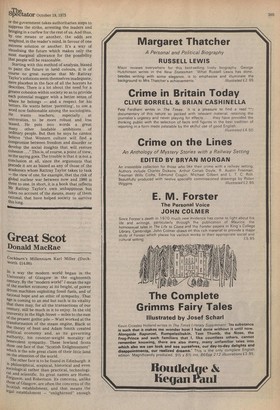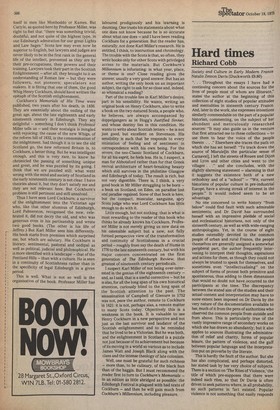Great Scot
Donald MacRae
Cockburn's Millennium Karl Miller (Duckworth £14.00).
lo a way the modern world began in the University of Glasgow in the eighteenth century. By the "modern worldI mean the age of the market economy at it height, of power driven machines exploiting fossil fuels, and of rational hope and an ethic of sympathy. That age is coming to an end but such is its vitality that there may, for all the transactions of our Centur37, still be much in it to enjoy. In the old university in the High Street miles to the east of the present gothic pile Watt worked at the transformation of the steam engine, Black at the theory of heat and Adam Smith created political economy and, as its governing authority, his counter-weight morality of benevolent sympathy. These lowland Scots show one face of that "Scottish Enlightenment" Which is the sole great claim of their little land on the attention of the world.
The other face is to be found in Edinburgh: it is philosophical, sceptical, historical and even sociological rather than practical, technological and scientific. Its great names are Hume, Ferguson, and Robertson. Its concerns, unlike those of Glasgow, are often the concerns of the Scottish establishment, and that means the legal establishment "enlightened" enough. itself in men like Monboddo or Kames. But Carlyle, as quoted here by Professor Miller, was right to feel that "there was something trivial, doubtful, and not quite of the highest type, in our Edinburgh admiration for our great Lights and Law Sages." Scots law may even now be superior to English, but lawyers and judges are never likely to be in the first rank in the general life of the intellect, prevented as they are by their pre-occupations, their powers and their training. Lawyers took their part in the Scottish Enlightenment — after all, they brought to it an understanding of Roman law — but they were followers, not pioneers; speculators not makers. It is fitting that one of them, the good Whig Henry Cockburn, should have written the epitaph of the Scottish enlightenment.
Cockburn's Memorials of His Time were published, two years after his death, in 1856. They are essentially about the ending of the great age, about the late eighteenth and early nineteenth century in Edinburgh. They are delightful — something I don't think Professor Miller tells us — and their nostalgia is mingled with rejoicing: the cause of the new Whigs, of the reform bill of 1832, is the consummation of the enlightment. Sad though it is to see the old Scotland go, the new reformed Britain is, to Cockburn, a better thing. But he was intelligent enough, and this is very rare, to know he chronicled the passing of something unique and great, and he was puzzled by its going. I think that we are puzzled still: what went wrong with the mind and society of Scotland in the early nineteenth century is not clear. I have theories about it, but they don't satisfy me and they are not relevant here. But Cockburn's problem is still pertinent and still unsolved.
Thus I have seen Lord Cockburn; a survivor of the enlightenment into the Victorian age who, like that other alumnus of Edinburgh, Lord Palmerston, recognised the new, celebrated it, did not decry the old, and who was generous even in his partisanship and wrote two good books. (The other is his life of Jeffrey.) But Karl Miller sees him differently. His book starts from premises which surprised me, but which are salutary. His Cockburn is literary, sentimental, pastoral and oedipal as well as political, judicial and philosophical. He is more identified with a landscape — that of the Pentland Hills — than with a culture. He is seen in a continuity of Scottishness rather than in the specificity of legal Edinburgh in a given period.
This is well. What is not so well is the organisation of the book. Professor Miller has laboured prodigiously and his learning is daunting. One trusts his statements about what one does not know because he is so accurate about what one does — and I have been reading Cockburn for a generation. But the reader has, naturally, not done Karl Miller's research. He is entitled, I think, to instruction and chronology. The trouble with the Scots is that, so often, they write books only for other Scots with privileged access to the materials. But Cockburn's Millennium is infuriating: in what year, place, or theme is one? Close reading gives the answer, usually a very good answer. But has an author, writing the only book on an important subject, the right to ask for so close and, indeed, so whimsical a reading?
Part of the trouble lies in Karl Miller's desire, part in his sensibility. He wants, writing an original book on Henry Cockburn, also to write a book on the twy-natured Scots, a people who, he believes, are always accompanied by doppelgangers as in Hogg's Justified Sinner, and whose destiny lies in this condition. He wants to write about Scottish letters — he is not just good, but excellent on Stevenson. His sensibility is such that he responds to every intimation of feeling and of sentiment in correspondence with his own being. For the severe, the neo-Classic Scotland of Cockburn, for all his esprit, he feels less. He is, I suspect, a man for Abbotsford rather than for that Greek revival architecture of heart-breaking beauty which still survives in the philistine Glasgow and Edinburgh of today. The result is rich, but not very digestible. There is, I think, a very good book in Mr Miller struggling to be born — a book on Scotland, on Eden, on paradise lost and paradise regained. Some of that book is here, but the compact, muscular, sanguine, spry Scots judge who was Lord Cockburn has little enough to do with it.
Little enough, but not nothing: that is what is most rewarding to the reader of this book who thinks he already knows his Cockburn. Professor Miller is not merely giving us new data on his ostensible subject but a new, not fully formed perspective view of the transformation and continuity of Scottishness in a crucial period — roughly from say the death of Hume in 1776 to the late nineteenth century, but with his major concern concentrated on the first generation of The Edinburgh Review, that greatest of nineteenth century periodicals.
I suspect Karl Miller of not being over-interested in the genius of the eighteenth century — and, as I said, that is a useful corrective — but he is also, for all the long span of his own historical attention, curiously blind to the long span of the Scottish attention to the past. The assassination of Campbell of Glenure in 1752 was not, pace the author, remote to Cockburn in 1821: it is not, perhaps alas, a remote matter to many Scots today. Objectively this is a weakness in the book. It is valuable to see Henry Cockburn in a new perspective and not just as the last survivor and laudator of the Scottish enlightenment and to be reminded that he lived to be a Victorian. But he was both, and the enlightenment in Scotland is a puzzle not just because of its achievement but because of its moving in a world so various as to include James Watt and Joseph Black along with the clans and the intense theology of late colonism.
Well, one must be grateful for such richness — more than, to be culinary, of the black bun than of the haggis. But I must recommend the reader first to turn to Cockburn's Memorials — in an edition as little abridged as possible: the Edinburgh Festival is plagued with bad texts of Cockburn — and then he will gain much from Cockburn's Millennium, including pleasure.



































 Previous page
Previous page